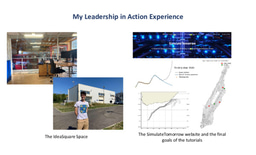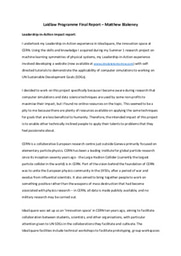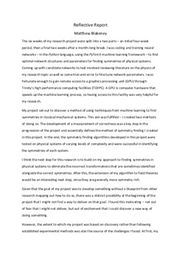Laidlaw Scholarship Reflection
The Laidlaw Programme has been a transformative experience, significantly impacting both my academic and personal development. One of the standout aspects of the programme has been the chance to connect with students from such a broad range of disciplines across the university—people I might not have crossed paths with otherwise. The rich diversity in both cultural and academic backgrounds always brought an extra layer to our discussions, whether in formal leadership training workshops or more casual meet-ups with other scholars. This exposure has expanded my appreciation for interdisciplinary collaboration. I’ve come to see how bringing together different perspectives can generate fresh, innovative solutions that a more narrow approach might overlook. It has also influenced the way I assess my own ideas, making me more conscious of how people from different backgrounds might perceive them, something I may not have considered in the past.
My Leadership in Action experience in IdeaSquare at CERN deepened this understanding of the value of diversity. CERN, being Europe’s foremost nuclear research laboratory, attracts people from all over the world, so working in a multicultural environment became a daily experience. Conversations often revolved around comparing diffenernt cultural experiences, and this sharing of perspectives created an atmosphere of openness and respect. Far from being just an exchange of ideas, it felt like a celebration of our differences. I realized that this is exactly the kind of environment CERN was designed to foster—a united community of scientists from across Europe and beyond. From a leadership perspective, the biggest lesson I took away from this experience is that cultural differences should be embraced as opportunities for learning and growth. Rather than shying away from these conversations, they can actually help bring teams closer together by highlighting shared human experiences, even when the details differ.
Through the leadership development training I took part in through the Laidlaw Programme, I also came to see that the traits often associated with leadership—empathy, emotional intelligence, integrity, and a growth mindset—aren’t just relevant for leaders, but for anyone striving to be a well-rounded individual. This was a key philosophy behind the Oxford Ethical Leadership Programme, which I completed as part of the Laidlaw experience. The sessions there focused on cultivating these soft skills and gave us practical tools to develop them further. We also tackled more specific skills, like public speaking, during workshops at Trinity, but what struck me most was the emphasis on leadership as a collaborative effort. It’s not about wielding power over others, but about creating an environment where the entire team can thrive. Leaders, when leading well, should only be in the spotlight in moments of crucial decision-making or when navigating a crisis, and even then, the aim is to uplift the team, not dominate it.
Reflecting on the Laidlaw Programme as a whole, it’s clear that it has played a significant role in my personal and professional growth. I’ve become more confident in my research abilities and have gained valuable project management skills, all while learning more about myself and the kind of leader I want to be. I’m far better equipped to take on leadership roles in the future, with a deeper understanding of the importance of inclusivity and collaboration. Ultimately, the lessons I’ve learned about working across cultures and disciplines will continue to shape the way I lead, ensuring that I remain open-minded, thoughtful, and, above all, focused on helping others succeed.





Please sign in
If you are a registered user on Laidlaw Scholars Network, please sign in